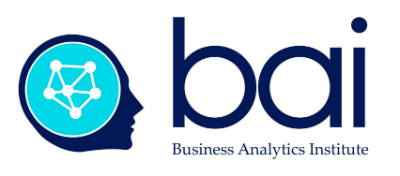BAI - What do managers need to know about Data Science?
What do managers need to know about data science?

The French publisher Ellipses contacted my colleague Farid Makhlouf and I recently to produce a university textbook on data science for business students. Because there are several valuable introductory texts to data science already on the market, we decided to address the more inclusive subject of Business Analytics. What do future managers need to understand about data, decision science and machine learning to add value to their organizations and their clients?
Read moreSuccessful management isn't a question of machine learning...
Successful management isn't a question of machine learning...

In the last few weeks of Spring Term, the students aren’t the only ones looking forward to summer. As I was listening attentively to the group presentations one Tuesday morning, I couldn’t help but wonder whether I would be heading off to the tennis courts that afternoon. As I received a call from a friend during the mid-morning break offering to play, I took stock of the weather: sunny, hot, windy, and slightly humid. The last fourteen times I had considered playing, the conditions weren’t quite the same. All other things being equal, can you predict whether I was on the courts that afternoon?
Read moreBanking on the Facts - what is expert advice worth?
Banking on the Facts - what is expert advice worth?

When moving on to my next assignment a few years ago I received the visit of three of my new colleagues. I was quite surprised to hear the first confess that “the first thing you have to learn here is that everyone lies about everything”. The second visitor wasn’t any more inspiring in vouching that she alone told the truth. The third visitor — as they say in French “jamais deux sans trois” — tried to “reassure” me that previous two would be struck by lightning if they ever spoke honestly. In a Smullyanian world in which people are either eternally truthful or disingenuous, which of my three visitors was to be believed?[i]
Read moreTurning Data into Dollars?
Turning Data into Dollars ?

During his interview last week at the DataWorks summit, Bill Schmarzo brought up the fundamental question of the value of the data organizations are collecting with each click of the mouse.[i] When confronted with claims that “data is the new currency” [ii] and that organizations should strive to “monetize their data”[iii]; one should point out the difference between data’s value of exchange vs. its value in use. I couldn’t agree more with his conclusion that “The value of that data comes from putting it into use to make better decisions.” As we have previously suggested, data is nothing more than a proxy for the reality of our business, it has no intrinsic value outside the customer experience of our colleagues, business partners and external stakeholders.[iv] Which types of data will highlight these differing perceptions of value?
Read moreMeasure the quality of your decisions.... and not just your data
Measure the quality of your decisions....
and not just your data

Data will always take a back seat in the drive towards better decision-making. As companies spend increasing amounts of time and effort in capturing organizational and market data, the return on these investments will continue to depend on our ability to transform the data into impactful decisions. Data alone doesn’t produce good decisions for decision-making is constantly handicapped by uncertainty, ambiguity, and complexity. Measuring the quality of our decision-making may well prove more important than improving the quality of our data. Let’s look both at why measuring decision-making is so difficult, and why it is so potentially rewarding.
Read moreData Science’s Dirty Little Secrets
Data Science’s Dirty Little Secrets
Defining the knowledge and skill set of today’s data scientist is proving to be a quite a problem despite the considerable number of contributions on the subject.[i] This challenge hasn’t kept trade specialists from projecting an monumental gap between the supply and demand for such “specialists” worldwide [ii]; while LinkedIn’s 2017 survey of the ten most marketable skills highlights statistical analysis, data modeling and data presentation[iii]. Ever since William Cleveland proposed the term “data science” in 2001 as a junction between the fields of computer science and statistics — the superlatives of “superstar” “ninja rock star”, and “sexy unicorns” have done little to help business and higher education understand the specifics of the trade. What exactly sets the data scientist apart from the rest of the field?
Read moreWhat is the key to demonstrating managerial brilliance?
What is the key to demonstrating managerial brilliance?
To begin with, have your team’s strategy written by an outside consultant. Ask your marketing team to transform the document into a thirty-slide presentation with lots of animated graphics to wow your audience. Present the slides to your team, insist on vague acronyms that no one will understand and cite figures that no one will verify. After you talk, send your stakeholders a self-congratulatory e-mail on such a great presentation, but don’t attach the strategy document in question.
If you agree with any of the above points, reading this post will be a waste of your time.
Read more
Data isn't just data
Data isn't just data
Part of this story we have heard before. Data is everywhere – we have produced more data in the last two years than in the history of mankind [1]. Data is the lifeblood of the Fourth Industrial Revolution – advances in internet technologies and business analytics will be the new foundations of sustainable competitive advantage [2]. Digital strategies are no longer designed around websites, but in digital platforms designed to capture consumer actions, preferences and motivations. This said, data remains nothing more than imperfect representations of the business realities around us. What do we mean by making a better use of data?
Read moreDesign Thinking is all about making better decisions
Design Thinking is all about making better decisions
What is the link between design thinking and innovation? A quick search today for “Design Thinking degrees” on Google turned up 4,420,000 results. Universities and corporate education propose an impressive array of variants of Ideo’s original vision ofempathizing, defining, ideating, prototyping, and testing. In spite of the staggering numbers of programs pitching “design thinking”, there is little proof of a direct relationship between design and innovation.[i] John Kennedy asserts that mainstream visions of design thinking are often shallow and misdirected.[ii] Let’s suggest that most are missing a critical point: design thinking requires a different approach to how we view the problems we are trying to solve, how we are using the data, and how we look for solutions.
Read moreChoices are easy when...
Choices are easy when....
everyone does what they were supposed to do. Unfortunately most of the decisions we face each day address situations that don’t go exactly as planned….
Let’s assume its playoff time and the basketball arena is packed. Each of the two-hundred and fifty fans in section 22 has purchased an assigned seat near half court. However, one teenager decides two hours before tipoff to sit with his friends in the third row rather than his own seat courtside. The fans file in after that attempting to sit in their own seat, but taking a random seat in the section if theirs is already taken. You worked late and unfortunately arrive just after the start of the game to find only one available seat left — the number is hidden by the crowd. What is the risk that by choosing to sit in this last available seat you will in fact be choosing one that you didn't purchase?
Read more





